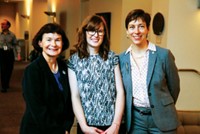Advertisement
Grab your lab coat. Let's get started
Welcome!
Welcome!
Create an account below to get 6 C&EN articles per month, receive newsletters and more - all free.
It seems this is your first time logging in online. Please enter the following information to continue.
As an ACS member you automatically get access to this site. All we need is few more details to create your reading experience.
Not you? Sign in with a different account.
Not you? Sign in with a different account.
ERROR 1
ERROR 1
ERROR 2
ERROR 2
ERROR 2
ERROR 2
ERROR 2
Password and Confirm password must match.
If you have an ACS member number, please enter it here so we can link this account to your membership. (optional)
ERROR 2
ACS values your privacy. By submitting your information, you are gaining access to C&EN and subscribing to our weekly newsletter. We use the information you provide to make your reading experience better, and we will never sell your data to third party members.
Policy
ACS Debuts Chinese-Language News Site
ACS News: Society hopes to increase awareness of research done by Chinese scientists in their hometowns
by Linda Wang
January 7, 2010

The American Chemical Society has begun offering its news releases on publications authored by Chinese scientists, in Chinese—an effort it hopes will help raise the visibility of research done by Chinese scientists in the local Chinese media.
The releases are available to Chinese journalists through an ACS-managed site on Chinese EurekAlert! (chinese.eurekalert.org).
"Scientists in China now account for about 1 out of every 10 papers published in high quality, high impact ACS journals," says Susan King, senior vice president of the ACS Publications Division. "We hope that the new Chinese-language site will encourage news media in that country to publish stories that make the authors' families, neighbors, and colleagues more aware of how this world-class research improves everyday life."
The ACS Office of Public Affairs prepares the releases, which are based on research published in ACS's 38 peer-reviewed journals and publications. Chinese EurekAlert! is managed by the American Association for the Advancement of Science, which also runs the larger science news site, EurekAlert!.
"We're trying to reach not just the major news media outlets in China but also the local hometown community newspapers," says Michael Woods, assistant director of science communications in the ACS Office of Public Affairs. "We know from feedback that we get from scientists that one of the greatest benefits of publication in ACS journals is the response the scientists receive in their local communities."
Increased awareness of advances by Chinese scientists in China may have other benefits as well. "It may encourage students in smaller Chinese communities to consider a career in chemistry," says Woods. "And it may lead other individuals in the community to support the research."
Woods notes that depending on the success of the Chinese-language news site, ACS may expand its news releases to other languages, such as Japanese and Hindi. "ACS is an international chemistry organization," he says. "This is an example of ACS making an effort to reach global audiences."



Join the conversation
Contact the reporter
Submit a Letter to the Editor for publication
Engage with us on Twitter